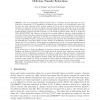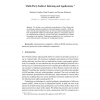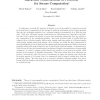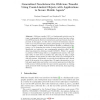11 search results - page 1 / 3 » How Many Oblivious Transfers Are Needed for Secure Multipart... |
CRYPTO
2007
Springer
13 years 8 months ago
2007
Springer
Oblivious transfer (OT) is an essential building block for secure multiparty computation when there is no honest majority. In this setting, current protocols for n 3 parties requ...
CRYPTO
2010
Springer
13 years 6 months ago
2010
Springer
Due to its universality oblivious transfer (OT) is a primitive of great importance in secure multi-party computation. OT is impossible to implement from scratch in an unconditional...
ASIACRYPT
2007
Springer
13 years 11 months ago
2007
Springer
Abstract. We develop a new multi-party generalization of Naor-Nissim indirect indexing, making it possible for many participants to simulate a RAM machine with only poly-logarithmi...
SIAMCOMP
2011
12 years 11 months ago
2011
In this paper, we study the question of whether or not it is possible to construct protocols for general secure computation in the setting of malicious adversaries and no honest m...
FC
2008
Springer
13 years 6 months ago
2008
Springer
Oblivious transfer (OT) is a fundamental primitive used in many cryptographic protocols, including general secure function evaluation (SFE) protocols. However, interaction is a pri...




